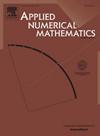基于量规-乌泽法的密度可变多流体力学方程数值近似法
IF 2.2
2区 数学
Q1 MATHEMATICS, APPLIED
引用次数: 0
摘要
本文考虑了密度可变的不可压缩磁流体动力学(MHD)系统的数值近似。首先,我们提供了基于高斯-乌泽法对流形式的一阶和二阶时间离散化方案。其次,我们证明了所提出的方案是无条件稳定的。我们还通过严格的理论分析提供了误差估计。然后,我们用空间有限元构建了一个完全离散的一阶方案,并提供了其稳定性结果。最后,我们通过一些数值实验来验证所提方案的有效性。此外,我们还介绍了守恒方案及其数值结果。本文章由计算机程序翻译,如有差异,请以英文原文为准。
Numerical approximation for the MHD equations with variable density based on the Gauge-Uzawa method
In this paper, we consider the numerical approximation of incompressible magnetohydrodynamic (MHD) system with variable density. Firstly, we provide first- and second-order time discretization schemes based on the convective form of the Gauge-Uzawa method. Secondly, we prove that the proposed schemes are unconditionally stable. We also provide error estimates through rigorous theoretical analysis. Then, we construct a fully-discrete first-order scheme with finite elements in space and provide its stability result. Finally, we present some numerical experiments to validate the effectiveness of the proposed schemes. Furthermore, we also present the conserved scheme and its numerical results.
求助全文
通过发布文献求助,成功后即可免费获取论文全文。
去求助
来源期刊

Applied Numerical Mathematics
数学-应用数学
CiteScore
5.60
自引率
7.10%
发文量
225
审稿时长
7.2 months
期刊介绍:
The purpose of the journal is to provide a forum for the publication of high quality research and tutorial papers in computational mathematics. In addition to the traditional issues and problems in numerical analysis, the journal also publishes papers describing relevant applications in such fields as physics, fluid dynamics, engineering and other branches of applied science with a computational mathematics component. The journal strives to be flexible in the type of papers it publishes and their format. Equally desirable are:
(i) Full papers, which should be complete and relatively self-contained original contributions with an introduction that can be understood by the broad computational mathematics community. Both rigorous and heuristic styles are acceptable. Of particular interest are papers about new areas of research, in which other than strictly mathematical arguments may be important in establishing a basis for further developments.
(ii) Tutorial review papers, covering some of the important issues in Numerical Mathematics, Scientific Computing and their Applications. The journal will occasionally publish contributions which are larger than the usual format for regular papers.
(iii) Short notes, which present specific new results and techniques in a brief communication.
 求助内容:
求助内容: 应助结果提醒方式:
应助结果提醒方式:


